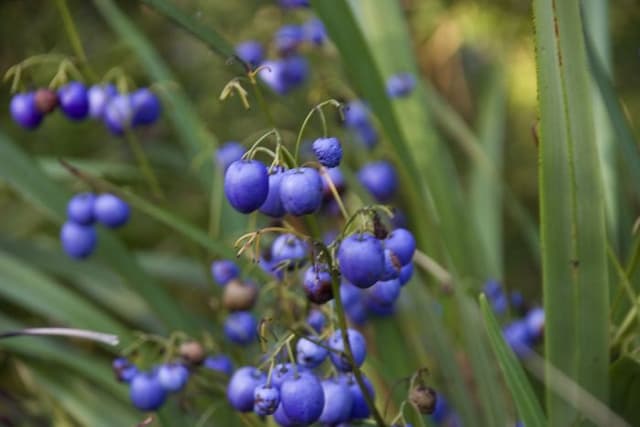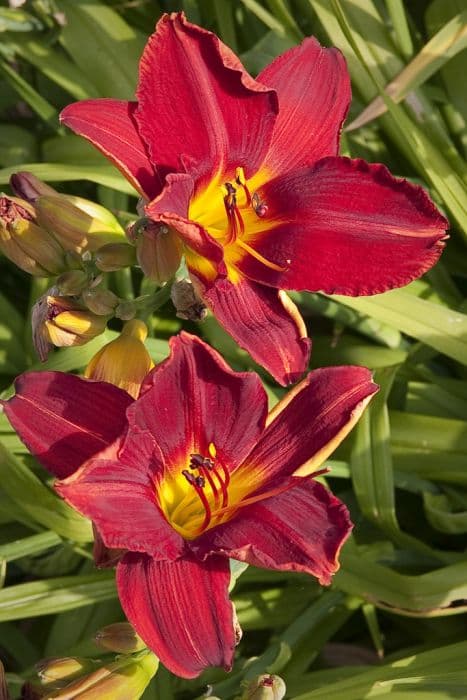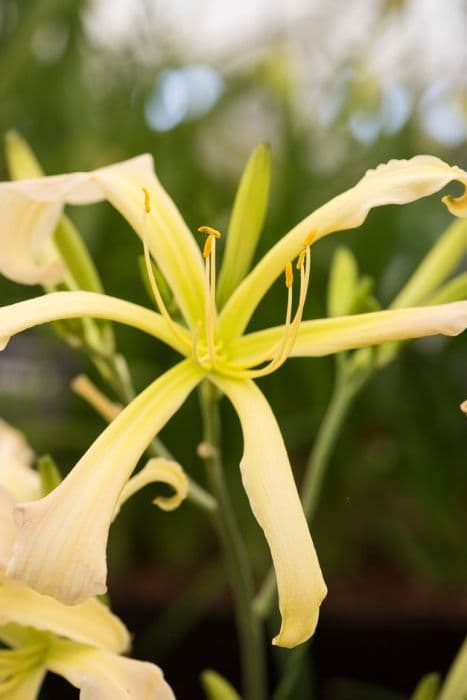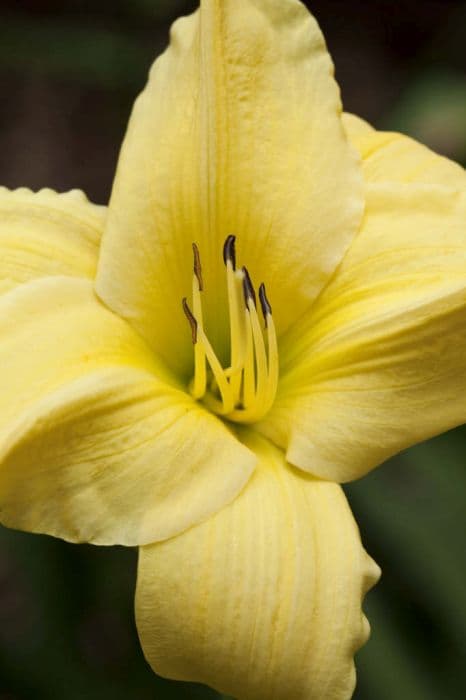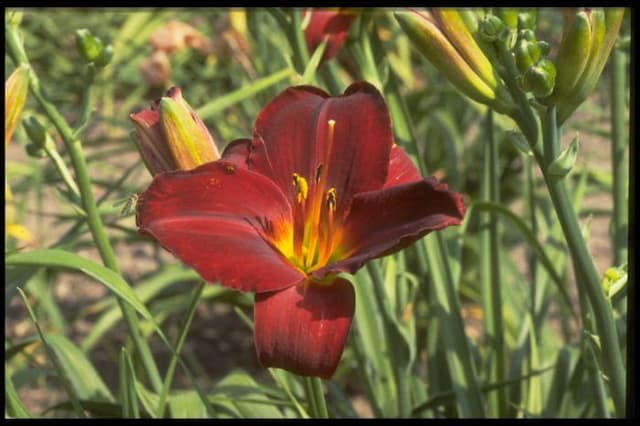Daylily Hemerocallis 'Lemon Bells'

ABOUT
The 'Lemon Bells' Daylily boasts a stunning display of vibrant yellow, bell-shaped flowers. Each blossom is characterized by its rich, lemony hue which exudes a sense of warmth and summery cheer. The petals are long and somewhat ruffled, radiating outwards from a throat of contrasting color, which adds depth and intrigue to the flower's appearance. These blossoms typically have a delicate and graceful curve to them, giving the impression of a light, airy bell. The foliage of the Daylily 'Lemon Bells' is also quite striking. It forms a dense clump of long, narrow, strap-like leaves. The leaves' deep green color provides a lush backdrop that makes the bright yellow flowers stand out even more prominently. The leaves often arch gracefully, adding to the overall elegance of the plant. In full bloom, the Daylily 'Lemon Bells' is a captivating sight, drawing the eye with its bold color and graceful lines. The flowers emerge on strong stalks that rise from the verdant clump of foliage. Each stalk may host several buds, which open in succession to provide a prolonged display of beauty. These blooms are known not only for their aesthetic appeal but also for their ability to attract pollinators such as bees and butterflies, adding even more life and vibrancy to the garden space where they are planted.
About this plant
 Names
NamesFamily
Hemerocallidaceae
Synonyms
Daylily, Lemon Bells Daylily
Common names
Hemerocallis 'Lemon Bells'
 Toxicity
ToxicityTo humans
Daylilies (Hemerocallis 'Lemon Bells') are not generally considered toxic to humans. In fact, some cultures use parts of certain daylily varieties in their cuisines. However, ingestion should be approached with caution since sensitivity can vary, and some individuals might experience mild stomach upset if they consume parts of the plant without prior knowledge of their personal reaction.
To pets
Daylilies are known to be highly toxic to cats. If a cat ingests any part of a daylily, it can lead to severe kidney damage, which can be fatal if not treated promptly. Symptoms of daylily poisoning in pets, particularly cats, may include vomiting, lethargy, kidney failure, and lack of appetite. Immediate veterinary attention is crucial if a pet has consumed any part of a daylily. Dogs are not generally as sensitive as cats, but they can still experience mild gastrointestinal upset if they consume daylilies.
 Characteristics
CharacteristicsLife cycle
Perennials
Foliage type
Deciduous
Color of leaves
Green
Flower color
Yellow
Height
2-3 feet (0.6-0.9 meters)
Spread
2-3 feet (0.6-0.9 meters)
Plant type
Herb
Hardiness zones
3-9
Native area
Asia
Benefits
 General Benefits
General Benefits- Easy to Grow: Daylily 'Lemon Bells' is known for being easy to cultivate, requiring minimal maintenance once established.
- Drought Tolerance: It can withstand periods of drought, which makes it suitable for xeriscaping or gardens in dryer climates.
- Attracts Wildlife: The vibrant flowers of the Daylily 'Lemon Bells' are attractive to butterflies and hummingbirds, contributing to local biodiversity.
- Long Blooming Period: This cultivar offers a long blooming season, providing colorful flowers throughout most of the summer.
- Rapid Growth: Daylily 'Lemon Bells' has a fast growth rate, quickly filling in garden spaces and providing substantial coverage.
- Erosion Control: The root system can help to stabilize soil and prevent erosion, making it an excellent choice for sloped areas.
- Edible Parts: Certain parts of daylilies are edible and can be used in culinary applications, adding a unique flavor to dishes (please refer to safe use and expert advice before consumption).
- Aesthetic Appeal: With its bright lemon-yellow flowers, it adds a splash of color to any garden, enhancing the visual appeal of the landscape.
- Adaptable: Daylily 'Lemon Bells' is adaptable to a range of soil types and pH levels, making it versatile for different garden settings.
- Perennial Growth: As a perennial, it comes back year after year, reducing the need for replanting and maintenance.
 Medical Properties
Medical PropertiesThis plant is not used for medical purposes.
 Air-purifying Qualities
Air-purifying QualitiesThis plant is not specifically known for air purifying qualities.
 Other Uses
Other Uses- Edible Flowers: The blooms of the daylily are edible and can be added to salads or used as garnishes for a delightful floral flavor and aesthetic enhancement to dishes.
- Flower Arrangements: Daylily flowers are often used in floral arrangements for their vibrant colors and large, trumpet-shaped blooms, providing an eye-catching focal point.
- Dye Production: The petals of the daylily can be used to create a natural dye for fabrics, giving them a gentle yellow hue.
- Garden Borders: As a perennial with distinctive foliage, daylilies can be planted to create aesthetic and functional borders in gardens.
- Companion Planting: Daylilies can be used in companion planting to help deter certain pests from more vulnerable plants in the garden.
- Culinary Events: The daylily's blooms make a unique edible decoration for special culinary events such as weddings or garden parties.
- Photography: Due to their striking appearance, daylilies are a popular subject for botanical photographers and artists.
- Teaching Tool: In educational gardening programs, daylilies are often used to teach about plant lifecycles due to their rapid growth and daily blooming cycle.
- Bioindicator: Daylilies can serve as bioindicators, as their health and bloom may reflect the quality of their growing environment.
- Soil Stabilization: The robust root system of the daylily helps stabilize soil and prevent erosion in sloped garden areas.
Interesting Facts
 Feng Shui
Feng ShuiThe Daylily is not used in Feng Shui practice.
 Zodiac Sign Compitability
Zodiac Sign CompitabilityThe Daylily is not used in astrology practice.
 Plant Symbolism
Plant Symbolism- Perseverance: The common name for Hemerocallis 'Lemon Bells' is Daylily, which blooms for just one day. Its ability to bloom again after its brief display is symbolic of resilience and the ability to overcome challenges.
- Longevity: Daylilies often live for many years, some varieties even capable of living for decades, which makes them a symbol of long life and survival through time.
- Motherhood: In Chinese culture, daylilies are associated with motherhood due to their nurturing and caregiving nature as they produce numerous offspring (blooms).
- Renewal: As each day brings a new flower, the daylily is a representation of renewal, hope, and new opportunities.
- Forgetfulness: A more negative interpretation from the fleeting existence of the individual flowers suggests a symbol of forgetfulness or losing one’s memory.
- Coquetry: The delicate beauty of the daylily also conveys flirtation or playful behavior in the language of flowers.
 Water
WaterThe Daylily, commonly known as 'Lemon Bells', prefers consistent moisture, especially during the growing season. It should be watered deeply about once a week, ensuring at least one inch of water is applied each time. During hot, dry spells, increase watering to twice a week. It's important to avoid shallow watering, which won't reach the deeper roots. Use a soaker hose or drip irrigation for the best results, allowing the water to slowly penetrate the soil and minimize evaporation. Overhead watering should be avoided to prevent leaf spot diseases. Adjust the watering schedule during rainy periods to prevent overwatering.
 Light
LightDaylilies, including 'Lemon Bells', thrive in full sun, requiring at least six hours of direct sunlight daily for optimal blooming. An ideal spot is one where they receive morning sun and some light afternoon shade, particularly in hotter climates. However, they can also tolerate partial shade, although the number of blooms might be reduced.
 Temperature
TemperatureDaylilies like 'Lemon Bells' are hardy and adapt well to a range of temperatures. They can survive winter temperatures down to about 20 degrees Fahrenheit, and during their growing season, they prefer temperatures between 55 and 75 degrees Fahrenheit. Excessive heat above 90 degrees Fahrenheit might affect blooming and overall health, so some afternoon shade can be beneficial in very hot climates.
 Pruning
PruningDaylilies, including 'Lemon Bells', benefit from pruning to remove spent blooms and stalks, encouraging new flowers and improving the plant's appearance. Deadheading, or snipping off old flowers, should be done regularly during the blooming season. In late fall or early spring, cut back the foliage to the ground to tidy up the garden and allow for new growth. Removing old foliage can also help reduce the risk of pests and diseases.
 Cleaning
CleaningAs needed
 Soil
SoilDaylilies prefer well-draining soil with abundant organic matter. A mix of two parts loam, one part peat moss or compost, and one part sand or perlite is ideal. The best soil pH for daylilies is slightly acidic to neutral, ranging between 6.0 and 7.0.
 Repotting
RepottingDaylilies, commonly known as 'Lemon Bells', typically do not require frequent repotting. They should be divided and repotted every three to five years to maintain vigor and prevent overcrowding.
 Humidity & Misting
Humidity & Misting'Lemon Bells' daylilies are not particularly humidity sensitive and thrive in average outdoor humidity levels. No specific humidity requirements are needed apart from natural rainfall and ambient conditions.
 Suitable locations
Suitable locationsIndoor
Provide bright light and good air circulation for 'Lemon Bells' indoors.
Outdoor
Plant 'Lemon Bells' in full sun to partial shade and water regularly.
Hardiness zone
3-9 USDA
 Life cycle
Life cycleThe life cycle of the Daylily 'Lemon Bells' begins with seed germination, typically in spring or early summer, depending on the climate. Seedlings develop root systems and foliage, gradually forming a clump of grass-like leaves. As the plant matures, it enters the vegetative stage, where it often reaches full size and continues to grow and spread primarily through its rhizomatous root system. The daylily then enters the reproductive stage, producing tall scapes topped with lemon-yellow, bell-shaped flowers that often bloom for just one day during the summer months. After pollination, the flowers produce seed pods that mature, reaching full development by late summer or early fall. As winter approaches, the above-ground foliage dies back, and the plant enters dormancy, re-emerging in the next growing season.
 Propogation
PropogationPropogation time
Early Spring
Hemerocallis 'Lemon Bells', commonly known as the Daylily, is best propagated by division. The ideal time to divide Daylilies is in early spring or immediately after they finish flowering in the summer. To propagate by division, carefully dig up the clump of Daylily, being mindful to keep as many roots intact as possible. Gently pull the clump apart with your hands or use a sharp knife to separate the fans of leaves, ensuring that each division has at least two or three fans and a portion of the root system. Replant the divisions promptly, maintaining the same depth they were growing at previously, and water them in well to help establish the new plants. This method of vegetative propagation not only creates new plants but also invigorates the parent plant, encouraging more vigorous growth and blooming.





